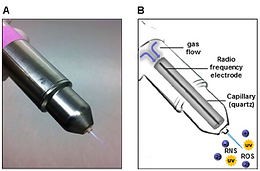

Cold Atmospheric Plasma Treatment Induces Anti-Proliferative Effects in Prostate Cancer Cells by Redox and Apoptotic Signaling Pathways
One of the promising possibilities of the clinical application of cold plasma, so-called cold atmospheric plasma (CAP), is its application on malignant cells and cancer tissue using its anti-neoplastic effects, primarily through the delivery of reactive oxygen and nitrogen species
(ROS, RNS). In this study, we investigated the impact of CAP on cellular proliferation and consecutive molecular response mechanisms in established prostate cancer (PC) cell lines. PC cells showed a significantly reduced cell growth following CAP treatment as a result of both an immediate increase of intracellular peroxide levels and through the induction of apoptosis indicated by annexin V assay, TUNEL assay, and the evaluation of changes in nuclear morphology.

Plasma oncology - Physical plasma as innovative tumor therapy
Physical applications are an integral part of diagnostic and therapeutic procedures and modern medicine would be unthinkable without them. With physical plasma, a technology that has long been used for technical purposes has found its way into medical applications. The use of cold physical plasmas in oncological therapy appears to be of particular interest. First investigations indicate a variety of anticancer properties such as antiproliferative, antimetatstatic, and proapoptotic effects on tumor cells. Especially in combination with classical anti-cancer strategies such as surgical resection and chemotherapy.

Noninvasive Physical Plasma as Innovative and
Tissue-Preserving Therapy for Women Positive for Cervical
Intraepithelial Neoplasia
The treatment of cervical intraepithelial neoplasia (CIN) is still associated with the use of invasive therapeutic procedures. Although CIN 1/2 lesions show high remission rates, treatment is necessary in individual cases and noninvasive and oncologically safe therapeutic options should be available for these patients. Here, we characterized the antineoplastic properties of noninvasive physical plasma (NIPP) at the in vitro, ex vivo and in vivo levels and performed a prospective, single-armed phase-IIb trial on 20 patients with CIN1/2 (NCT03218436). NIPP-treated dysplastic cell models exhibited significant cell growth retardation due to DNA damage, cell cycle arrest and apoptosis.


